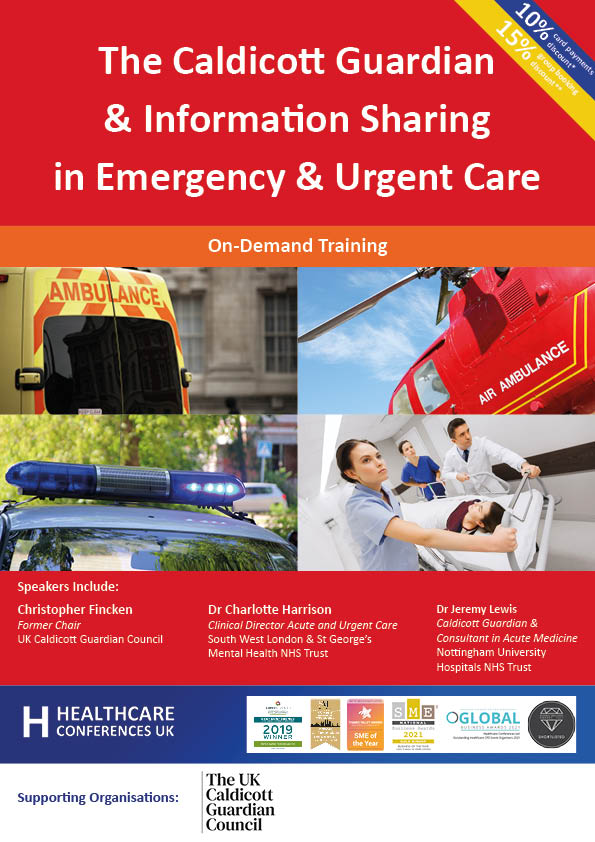On-Demand virtual training
Find out more about On-Demand training
Healthcare Conferences UK in association with Christopher Fincken, Independent Member UK Caldicott Guardian Council, (Chairman) are pleased to announce this on-demand conference which will focus on Information Sharing and Caldicott Principles in Emergency and Urgent Care. Following the success of our previous Caldicott Guardian National Conferences, and feedback from our regular Caldicott Training Masterclasses, this on-demand conference will focus on developing your role in improving communication and information sharing in emergency situations whilst ensuring patient confidentiality.
The on-demand conference will include national updates, interactive case study based small group work, and case studies from Ambulance Trusts, Emergency Care/Accident and Emergency, Air Ambulance Services, Mental Health Crisis Care and Major Incident Planning. The conference will also discuss data sharing consent issues and implied consent in emergency situations.
“Much information sharing takes place in a pre-planned and routine way. As such, this should be governed by established rules and procedures. However, departments/staff may also decide, or be asked, to share information in situations which are not covered by any routine agreement. In some cases this may involve a decision about sharing being made in conditions of real urgency, for example in an emergency situation. All ad-hoc or oneoff sharing decisions must be carefully considered and documented”
“Trust is an essential part of the doctor patient relationship and confidentiality is central to this. Patients may avoid seeking medical help, or may under-report symptoms, if they think that their personal information will be disclosed by doctors without consent, or without the chance to have some control over the timing or amount of information shared.. If it is not practicable or appropriate to seek consent, and in exceptional cases where a patient has refused consent, disclosing personal information may be justifed in the public interest if failure to do so may expose others to a risk of death or serious harm. The benefits to an individual or to society of the disclosure must outweigh both the patient’s and the public interest in keeping the information confidential.”
This conference will enable you to:
- Understand and reflect on decision making around information sharing including the challenges of Covid-19
- Update your knowledge on ethical decision making principles and frameworks and how you can implement these in decision making practice
- Understand when information can be shared with relatives, other professionals and services, and when it cannot
- Learn from established practice in the delivery of Caldicott Principles in emergency situations
- Understand the legal and ethical implications around information sharing, consent (including implied consent) and the Duty of Candour
- Learn from case studies in emergency care of information sharing with police including reporting gunshot and knife wounds, suspected terrorism and significant risk of harm or injury to others, and managing requests around CCTV Images
- Improve practice in the rapid sharing of information when a major incident occurs
- Ensure you understand the implications of information sharing after death including the complexities of the ethical as well as legal considerations in how we handle data relating to the deceased with relatives, police and bereavement services
- Improve information sharing practice in emergency mental health crisis situations
- Apply the Caldicott Principles to various scenarios in emergency care through small breakout group case study exercises
- Self assess and reflect on your own practice




